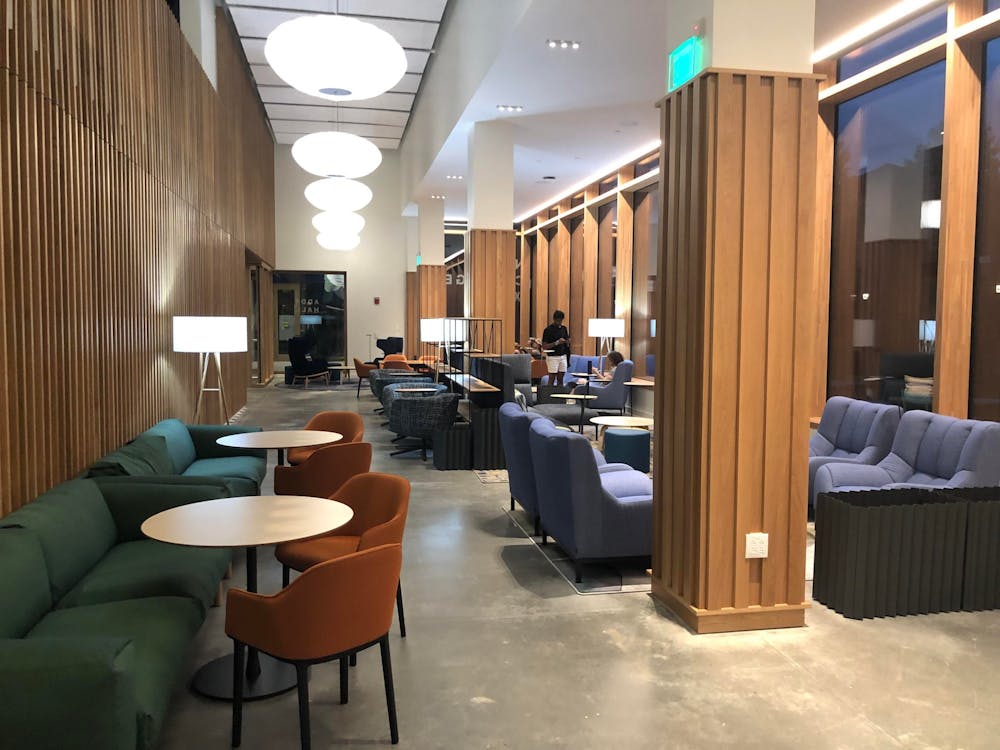Pulitzer Prize winner Jhumpa Lahiri debuted portions of her forthcoming translation of Ovid’s “Metamorphoses” on Saturday at 2 p.m. in Tuttle Lecture Hall at the new Princeton University Art Museum (PUAM). Her reading marked the 19th hour of the museum’s 24-hour opening celebration.
“In honor of all things new, I’m going to read some new work — work in progress that was very much born here at the University,” said Lahiri, a professor in Princeton’s Program in Creative Writing until 2022. “I’m so honored to be part of this incredible celebration of a museum transformed.”
According to James Steward, PUAM’s director, the museum had already welcomed around 20,000 people by the time of Lahiri's event.
Throughout her presentation, Lahiri read passages from two of her works: her novel “Whereabouts” and her translation of “Metamorphoses,” co-written with Princeton Classics professor Yelena Baraz. “Whereabouts” consists of 46 short chapters depicting the life of a single woman, which Lahiri described as about “isolation and how one interacts with one’s space.” She initially wrote it in Italian and then translated it into English herself. She told the audience the book was translated “exclusively in Firestone Library during COVID.”
Lahiri then read two passages from her and Baraz’s translation of “Metamorphoses.” The Latin epic, composed in the first century AD, spans over 250 myths and nearly 12,000 lines. Lahiri and Baraz have been working on their translation since the winter of 2021, and Lahiri hopes it will be completed “in a year.” The finished work will be published by Penguin Random House’s The Modern Library imprint.
“It has been the most transformative project of my life in every way,” Lahiri said. “I really feel profoundly changed by having lived in Ovid’s text in this way for all these years.”
Lahiri first read the story of Baucis and Philemon, from Book 8, in which the gods save the couple from a flood and turn their cottage into a temple — a transformation Lahiri compared to the museum’s renovation. She also read a passage from Book 15 of the story of Aesculapius, who cures Rome of plague.
“One of the reasons it moves me so much,” she said of the second passage, “is that I live part of my life in Rome now, and where this Greek god ends up in Rome is the Isola Tiberina, which is something I see and interact with and am crossing all the time.”

Lahiri also discussed her translation’s distinctive visual form. She experimented with unconventional stanza shapes so some “look like wings … and some of them look kind of like arrows.”
“In general, they look like either waves or clouds to me,” Lahiri added. She described waves and clouds as “deeply Ovidian” because of their metamorphic quality.
“There was a certain point when I was reckoning with how the poem was reading,” she explained. “It wasn’t quite flowing in the way I wanted it to, and Ovid’s poem is so much about water … and so I started to play with the form of the poem, literally.”
The audience largely consisted of non-students, though several students attended as well.

Sydney Kang, a student at West Windsor-Plainsboro High School North, said she became interested in Lahiri’s work after reading her debut novel “The Namesake” in her journalism class.
“I felt like I could connect with it on a deeper level than a lot of other books because it really associates with the experience of living on a campus that’s so prestigious,” Kang said in an interview with The Daily Princetonian.
“She’s also a fantastic writer,” continued Kang. “I thought [this] was a really awesome experience.”
Oliver Wu is a News contributor for the ‘Prince.’ He is from Stony Brook, N.Y. and can be reached at oliver.wu[at]princeton.edu.
Please send any corrections to corrections[at]dailyprincetonian.com.








